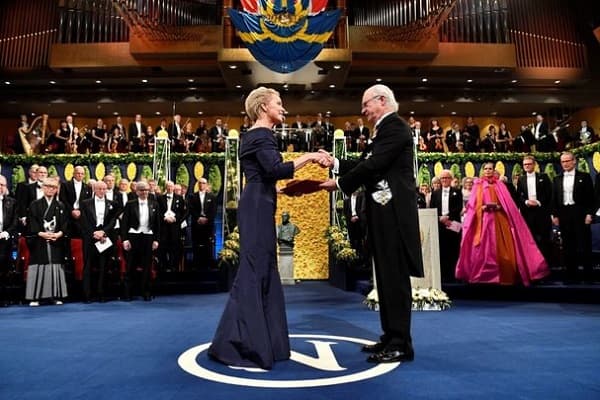17 Women With A Nobel Prize In Science
The Nobel Prize is awarded each year by the Royal Swedish Academy of Sciences, the Swedish Academy, the Karolinskay Institute and the Norwegian Nobel Committee.
These prizes are awarded to individuals who stand out for their outstanding contributions in the fields of chemistry, physics, literature, peace, physiology, medicine, and economics.
The prizes were instituted as the last wish of Alfred Nobel and each winner receives a gold medal, a diploma and a sum of money. They are awarded annually on December 10, which is the anniversary date of Alfred Nobel’s death.

The delivery takes place in Stockholm, the capital of Sweden, with the exception of the Nobel Peace Prize, which is delivered in Oslo, the capital of neighboring Norway.
The role of women in these awards, which celebrate 115 years of history, is very scarce, since only 49 women have won this award compared to 833 men. It should be noted that 2009 was the year in which more women have won the award with a total of five women awarded in that year.
In this article, we are going to talk about women who have won a Nobel in the field of chemistry, physics, physiology or medicine.
Women Who Have Won A Nobel Prize In Science
1. Marie Curie
As a pioneer in winning two Nobel Prizes and being the only woman in history awarded twice, is Marie Curie.
She received the Nobel Prize for Physics in 1903 and the Nobel Prize for Chemistry in 1911, an award she obtained for not patenting the process of isolating radium, with the aim that the entire scientific community could freely investigate with this element.
2. Irene Joliot-Curie
Daughter of the Nobel laureates Marie Curie and Pierre Curie, Irène, French physicist and chemist, was awarded the Nobel Prize in Chemistry in 1935, as a result of her work in the synthesis of new radioactive elements.
3. Gerty Cory
This American biochemist born in Prague, became the third woman in the world and the first in the United States, to win a Nobel Prize in Science, being also the first woman in the world to be awarded the Nobel Prize in Physiology or Medicine in the year 1947.
The award was given to him for discovering the mechanism by which glycogen is converted to lactic acid in muscle tissue and then re-synthesized in the body and stored as an energy source.
4. Maria Goeppert-Mayer
American theoretical physicist of German origin, was the second woman awarded the Nobel Prize in Physics, after Marie Curie, specifically in 1963. This Nobel was obtained for her proposal on the model of nuclear shells.
5. Dorothy Crowfoot Hodgkin
With the award of the Nobel Prize in Chemistry in 1964, Dorothy became the third woman to receive this award after Marie Curie and Irène Joliot-Curie. She was awarded for the determination of the structure of many biological substances using X-rays.
6. Rosalyn Yalow
She was awarded the Nobel Prize in Physiology and Medicine in 1977. This American doctor received this award for her progress in the field of radioimmunoassay peptide hormones, and in 1976 she was the first woman to be awarded the Albert Lasker Prize.
7. Barbara McClintock
Barbara McClintock, was an American scientist specializing in cytogenetics who won the Nobel Prize in Medicine or Physiology in 1983. This award was given to her discoveries in the field of genetic transposition, obtaining the prize alone.
8. Rita Levi Montalcini
Rita Levi-Montalcini was an Italian scientist specializing in neurology. In 1986, she was awarded the Nobel Prize in Medicine for her joint work with Stanley Cohen, which served to discover that cells only begin to reproduce when they receive the order to do so, an order that is transmitted by substances called growth factors.
9. Gertrude B Elion
American biochemist and pharmacologist, she was awarded the Nobel Prize in Medicine in 1988 for her discoveries of key principles in drug development and treatment. Throughout her career, Elion developed a multitude of drugs, motivated mainly by the death of her grandfather, who suffered from cancer.
10. Christiane Nusslein-Volhard
Christiane Nüsslein-Volhard, a German developmental biologist, was awarded the Nobel Prize in Medicine in 1995 for her discoveries on the genetic control of early embryonic development.
11. Linda Buck
Linda Buck is an American biologist, physician, and professor who was awarded the Nobel Prize in Physiology or Medicine in 2004 for her work on olfactory receptors.
12. Françoise Barré-Sinoussi
Nobel Prize in Medicine in 2008 for her discovery of HIV together with Luc Montaigner and Harald zur Hausen. Françoise Barré-Sinoussi, is a French biochemist and leader of the fight against HIV or AIDS in France.
In addition to winning the Nobel Prize in Medicine in 2008, she was president of the International AIDS Society from 2012 to 2014.
13. Elizabeth Blackburn
Elizabeth Blackburn is an Australian biochemist and the 2009 winner of the Nobel Prize in Medicine. This award, she was awarded for the discovery of how chromosomes are protected by telomeres and the enzyme telomerase.
14. Carol W Greider
Carol W. Greider is an American biochemist, who was awarded the 2009 Nobel Prize in Medicine, along with Elizabeth Blackburn and Jack Szostak. This award, she was awarded for the discovery of how chromosomes are protected by telomeres and the enzyme telomerase.
15. Ada Yonath
Ada Yonath, an Israeli crystallographer, received the Nobel Prize in Chemistry in 2009 for her advances in the study of ribosomes. Currently, she is the director of the Helen and Milton A. Kimmelman Center for Biomolecular Structure at the Weizmann Institute.
16. May-Britt Moser
Norwegian professor, neuroscientist and psychologist, she was awarded in 2014, for her discoveries of cells that constitute a positioning system in the brain, with the Nobel Prize in Physiology or Medicine, shared with John O’Keefe and Edvard Moser.
17. Youyou
Tu Youyou is a Chinese scientist, physician and pharmaceutical chemist, known for discovering artemisinin, used to treat malaria with which she saved millions of lives.
In 2015 she received the Nobel Prize in Physiology or Medicine. Youyou received half of the Nobel prize for discovering the efficacy of the antimalarial molecule from the plant Artemisia annua, and the other half was shared by Satoshi Omura and William Campbell for discovering a new compound, avermectin, capable of curing infections caused by small parasites.
Read Also: What Are The Countries With The Highest IQ
These are the 17 women who have made history getting a Nobel in the field of Chemistry, Physics, Physiology or Medicine.



![10 Best Universities to Study Physics in Canada [2024] 5 10 Best Universities to Study Physics in Canada [2024]](https://allroundgist.com/wp-content/uploads/2024/01/best-universities-to-study-physics-in-canada_1.jpg)


